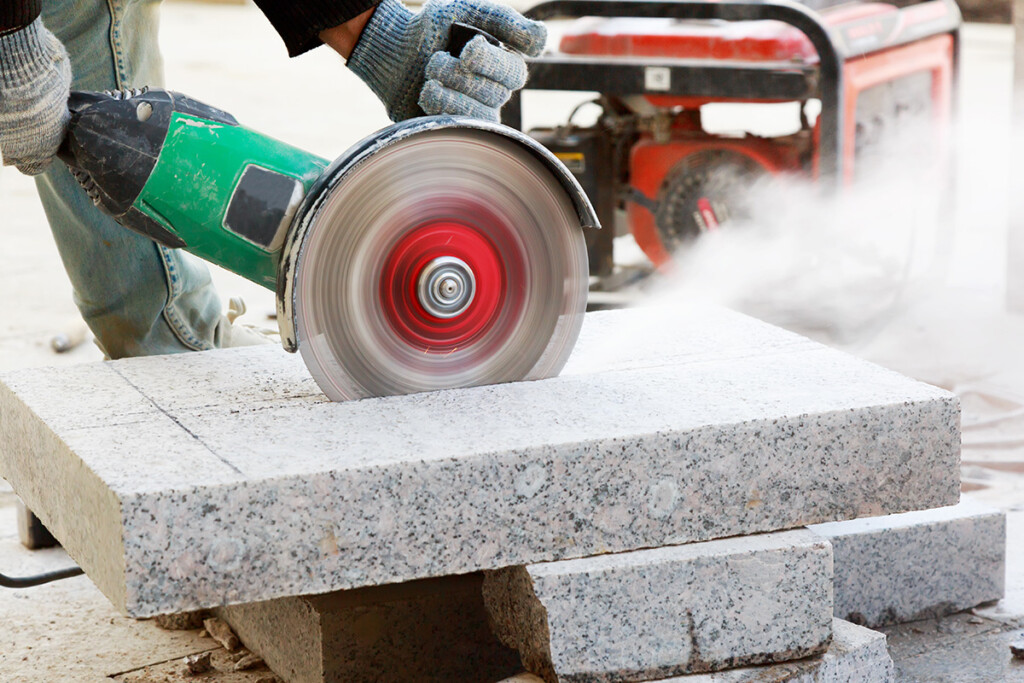From 1 July 2024, there will be an Australia-wide ban on the use, supply and manufacture of engineered stone benchtops, panels and slabs.
The ban is coming into place in response to rising rates of silicosis, an occupational lung disease caused by breathing in small particles of silica dust. Although there are a range of activities that can generate silica dust, the rates of silicosis have been particularly high in engineered stone workers.
What is engineered stone?
According to updated Work Health and Safety Regulations, engineered stone is defined as an artificial product that:
- contains at least 1% crystalline silica as a weight/weight concentration,
- is created by combining natural stone materials with other chemical constituents (such as water, resins, or pigments), and
- becomes hardened.
Engineered stone has been commonly used in Australia for kitchen benchtops, as an economical alternative to natural stone products like marble or granite. It’s known by various brand names including Caesarstone, Essastone and Quantum Quartz.
Why is engineered stone being banned?
When products containing crystalline silica are subject to mechanical processes like crushing, drilling, grinding, sawing or polishing, they can generate tiny, invisible dust particles known as respirable crystalline silica (RCS).
RCS particles can penetrate deep into the lungs and cause a serious, irreversible disease known as silicosis. Over the past decade, there have been over 500 documented cases of silicosis in Australia.
Crystalline silica occurs in natural stone as well as engineered stone. So why the ban on engineered stone specifically? According to Safe Work Australia:
While silicosis cases have been reported in workers using different types of silica-containing materials across a range of industries, a disproportionate number of silicosis cases are in engineered stone workers. In these workers (compared to workers exposed to silica from natural sources), silicosis is associated with a shorter duration of exposure to silica, faster disease progression and higher mortality.
Will silica still be a concern after the ban?
Even after the engineered stone is in place, there will still be a need for respirable crystalline silica risk assessment and monitoring services like those provided by Airsafe. This is for a number of reasons:
- The ban is only on engineered stone. Other products that contain crystalline silica, including natural stone, are not being banned. While the risk from working with these products is lower, it still exists and needs to be controlled.
- Only engineered stone benchtops, panels and slabs are being banned. Engineered stone products that are not intended to be processed, such as prefabricated sinks, jewellery and garden ornaments, will not be subject to the ban. However, any work that involves processing these products must be controlled.
- Previously installed engineered stone can still be worked on. Repairs, minor modification, removal and disposal of engineered stone benchtops, panels and slabs installed prior to the ban won’t be subject to the ban. However, all such work will need to be controlled, and businesses will need to notify WHS regulators such as SafeWork NSW in advance.
How can Airsafe help?
Whether you’re preparing your business to comply with the ban, or planning to engage in permitted work with engineered stone or other silica-containing products after it comes into force, Airsafe’s expert occupational hygiene team can help you comply with your legal obligations and keep your workers safe. We offer risk assessment, air monitoring and advice on controlling exposure to respirable crystalline silica.
For any questions about crystalline silica, call us on 1300 888 338.




